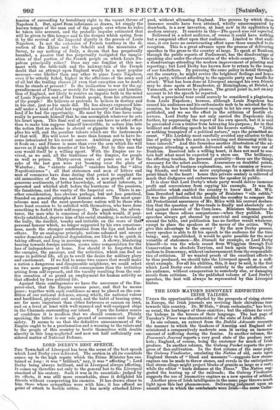LORD DERBY'S BEST SPEECH.
THE Town-hall of Liverpool has been the scene of the best speech which Lord Derby ever delivered. The oration in all its essentials comes up to the high repute which the Prime Minister has sus- tained so long : it was " brilliant," nay, it was " affecting " • Lord Derby being always brilliant, and in Liverpool always affecting. It comes up therefore not only to the general but to the Liverpool standard of his oratory. Such it was in its essentials : judged by its effects, it was still more remarkable, since it delighted his friends without exasperating his enemies. It has drawn closer to him those whose sympathies were with him ; it has offered no _point of attack to hostile critics. It has newly attached Liver- pool, -without alienating England. The process by which these immense results have been attained, wholly unaccompanied by drawback, is a new invention, at least neiv in its application to modern oratory. It consists in this—The speech was not reported. Delivered in a select audience, of course it could have nothing but a congenial effect upon that audience. Limited to that audi- ence, it can have no counteracting effect upon those unsuited to its reception. This is a great advance upon the process of -delivering speeches in the gross to the country at large. To speak at Bunkum through the public reports of Parliament, has the disadvantage of speaking also under the observation of the whole country. This is a disadvantage attending the modern improvement of printing and reporting ; but Lord Derby has known how to return to the usage of our forefathers. By pursuing the same policy in detail through- out the country, he might revive the brightest' feelings and hopes of his party, without affording to the opposite party any handle for attack. What has been done' atLiverpool amongst his own friends may be done again at Manchester, at Birmingham, at Bristol, at Yarmouth, or wherever he pleases. The grand point is, not on any account to let the speech be reported.
Such a provincial tour could scarcely be considered a plagiarism from Louis Napoleon ; because, although Louis Napoleon has caused his audiences and his enthusiastic mob to be selected for the occasion, he has been indiscreet enough to let his own speeches be published, and we see the effect in the criticism of hostile ob.. servers. Lord Derby has not only carried the Napoleonic idea further, by suppressing the report of his own speech, but it is said he prevented even a traitor from betraying his purpose ; for in that brilliant and affecting speech he told his hearers nothing. "Little or nothing transpired of a political nature," says the permitted an count. "His Lordship most carefully avoided any allusion to that line of policy which the nation is awaiting and discussing with in- tense interest." And this furnishes another illustration of the ad- vantages attending a speech delivered solely in the very ear of Bunkum. Received into a willing heart, it does not need to con- tain half what must be expected by a stern ear. The brilliancy, the affecting touches, the personal geniality—these are the things necessary for the select audience. Assurances on doubtful points, the dry details of business explanations, are for enemies or waver- ing friends, and would be mere surplusage in a speech delivered point-blank to the heart : hence this private oratory is relieved of much that disfigures and embarrasses the speaker in public.
It is clear that Lord Derby's whole party would derive immense profit and convenience from copying his example. It was the publication which enabled the country to know that Mr. Wil- liam Beresford had called the people of Braintree "vile rabble." It was the publication which enabled the Country to compare the old Protectionist assurances of Mr. Miles with his current declara- tion that the question of Free-trade is finally and absolutely set- tled against renewal of the Corn-laws. Ministers themselves do not escape these odious comparisons—when they publish. The speeches always get cheered by convivial and congenial guests around the table, and publication has no further result whatever, except to place the speakers at the mercy of the critics. Why give this advantage to the enemy ? By the new Derby process, every speaker is able to fit his speech to the audience for the time being; and, unpublished, it would be quite possible for the most versatile of statesmen—Mr. Disraeli for example, or Lord Derby himself—to run the whole round from Whiggism through Peel Conservatism to absolute Toryism, and back again through Dis- raelism to Democracy, without embarrassment from the responsibili- ties of criticism. If we wanted proofs of the excellent effects to be thus produced, we should take the Liverpool speech as a suffi- cient example. For all his abilities, this, it may be said, is the first which Lord Derby ever delivered entirely to the satisfaction of his audience without exasperation to somebody else, or damaging recoils from criticism. In the published volume of Lord Derby's speeches, the best will always be represented by this Liverpool hiatus.


























 Previous page
Previous page